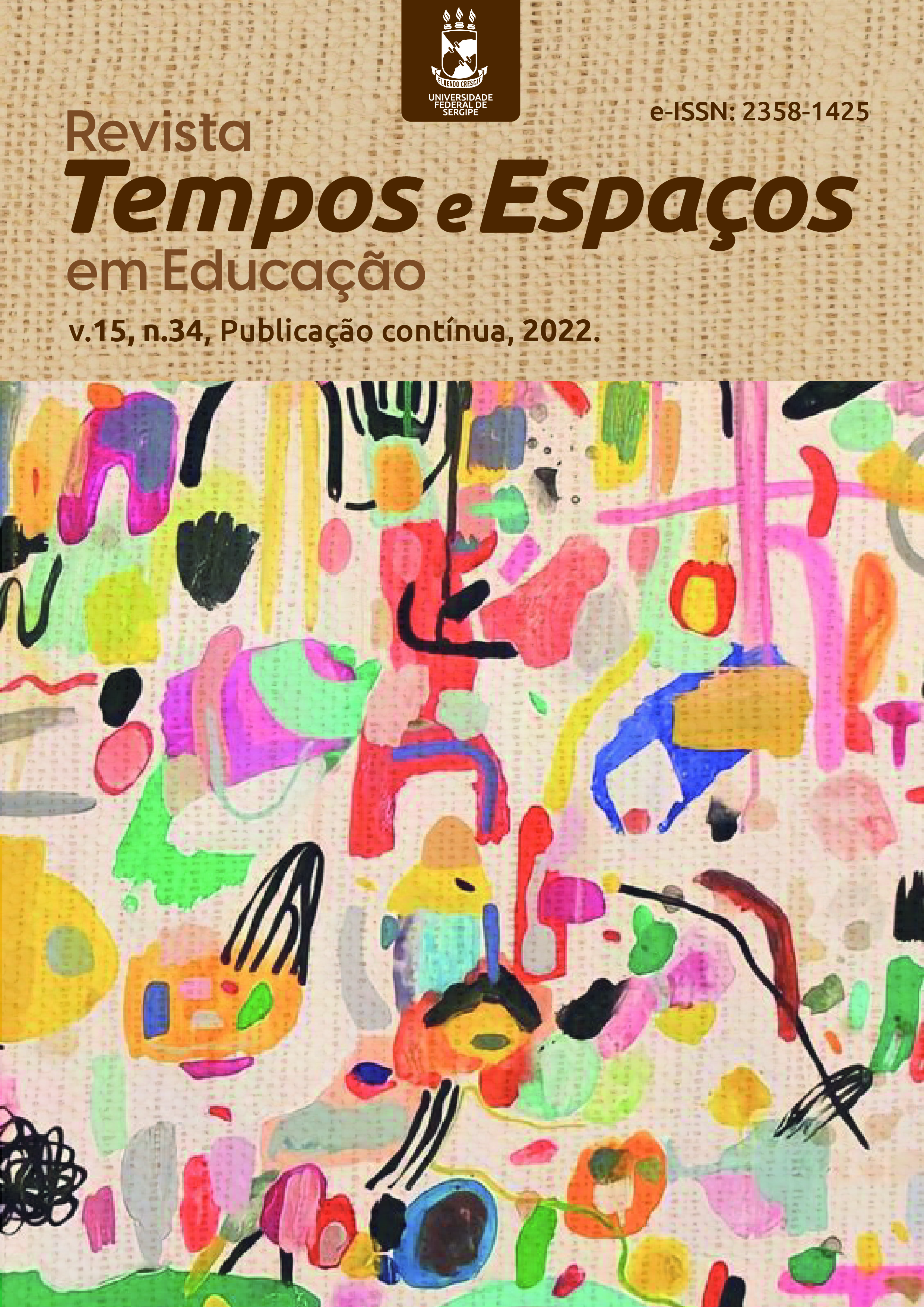Inovações linguísticas no processo educacional das universidades
DOI:
https://doi.org/10.20952/revtee.v15i34.17203Palavras-chave:
Formação profissional, Inovações linguísticas, Língua estrangeira, Pedagogia, Tecnologias de informação e comunicaçãoResumo
O objetivo principal do artigo é estudar as principais características e perspectivas das inovações linguísticas no processo educacional das universidades. Um importante diferencial do atual estágio de desenvolvimento, caracterizado pela integração e globalização do sistema mundial em várias esferas da vida e da atividade humana, é o processo de expansão da informatização. Nas condições da sociedade da informação, as modernas tecnologias de informação e comunicação são uma ferramenta profissional vital, cujo domínio determina a necessidade de uma pessoa como especialista no mercado de trabalho. As novas condições econômicas determinam o tipo de comunicação em que uma pessoa deve dominar pelo menos uma língua estrangeira. O conhecimento prático de uma língua estrangeira é uma das características mais importantes de um especialista de qualquer perfil. Portanto, a educação linguística ocupa uma das posições de liderança no sistema geral de educação e formação profissional de especialistas. Como resultado do estudo, analisou-se a relevância da introdução de inovações linguísticas no processo educacional das universidades, bem como os principais mecanismos desses processos.
Downloads
Referências
Bakhov, I., Ryzhykov, V. And Kolisnyk, O. (2018). Leadership Abilities of a Military Manager, Professionalism of a Commander as the Guarantee of the Practice of Effective Activity of a Military Organization. International Journal of Engineering & Technology, 7(4.38), 45-49. DOI: https://doi.org/10.14419/ijet.v7i4.38.24318
Choa, C-C (1999) ‘Theory and Research: New Emphases of Assessment in the Language Learning Classroom’, in Egbert, J and Hanson-Smith, E (eds) (1999) CALL Environments Research, Practice and Critical Issues. Alexandria, Va.: TESOL.
Cole, M., Shelley, D. and Swartz, L. (2014), “Online instruction, e-learning, and student satisfaction: a three year study”, The International Review of Research in Open and Distance Learning, Vol. 13 No. 6, available at: www.irrodl.org/index.php/irrodl/article/view/1748/3123
Jandri, P., Knox, J., Besley, T., Ryberg, T., Suoranta, J., & Hayes, S. (2018). Postdigital science and education. Educational Philosophy and Theory, 50(10), 893–899. https://www.tandfonline.com/doi/abs/10.1080/00131857. 2018.1454000 DOI: https://doi.org/10.1080/00131857.2018.1454000
Kolgatin O., Kolgatina L. (2019) Information and communication technologies in education as a component of pedagogical science of Ukraine in the field of pedagogy theory in the 90s of the twentieth century" Information technologies and teaching aids, vol. 72, No 4, 41-54, DOI: https://doi.org/10.33407/itlt.v72i4.2798
Kovalevskaia, N., Gilyazeva, E. N., Lobazova, O. F., Duborkina, I. A., & Sokolova, A. P. (2021). Impact of digital services of hybrid cloud-based learning environment on efficiency of education. Revista Tempos E Espaços Em Educação, 14(33), e15297. https://doi.org/10.20952/revtee.v14i33.15297
Kryshtanovych, M., Kryshtanovych, S., Stechkevych, O., Ivanytska, O., & Huzii, I. (2020). Prospects for the Development of Inclusive Education using Scientific and Mentoring Methodsunder the Conditions of Post-Pandemic Society. Postmodern Openings, Vol.11. No.2, 73-88. https://doi.org/10.18662/po/11.2/160
Küçükgöz, M. (2021). The effect of paternalist leadership style of principals on the professional burnout of special education teachers. Revista Tempos E Espaços Em Educação, 14(33), e16089. https://doi.org/10.20952/revtee.v14i33.16089
Marek, M. & Wu, Wen-Chi & Chew, Chiou Sheng. (2020). Teacher Experiences in Converting Classes to Distance Learning in the COVID-19 Pandemic. International Journal of Distance Education Technologies. 19. 40-60. DOI: https://doi.org/10.4018/IJDET.20210101.oa3
Mayes, T and De Freitas, S (2004) Review of e-learning theories, frameworks and models. Available online at: www.jisc.ac.uk/whatwedo/programmes/elearningpedagogy/workshops/session1.aspx
Norkina, O.F. (2009). Valuable orientations of education in the context of European integration. Scientific Bulletin of Chernivtsi University, 433 Series "Pedagogy and Psychology", 92-103.
Robinson, K. (2015), Creative Schools: The Grassroots Revolution that’s Transforming Education, Viking Press, New York, NY.
Serdyukov, P., Subbotin, I. and Serdyukova, N. (2003), “Accessible, convenient and efficient education for working adults in a shorter time: is it possible?”, CAEL Forum and News, Vol. 26 No. 3, pp. 24-28.
Waters, A (2012) Trends and issues in ELT methods and methodology.English Language Teaching Journal 66/4: 440–449
Downloads
Publicado
Como Citar
Edição
Seção
Licença
À Revista Tempos e Espaços em Educação ficam reservados os direitos autorais pertinentes a todos os artigos nela publicados. A Revista Tempos e Espaços em Educação utiliza a licença https://creativecommons.org/licenses/by/4.0/ (CC BY), que permite o compartilhamento do artigo com o reconhecimento da autoria.



